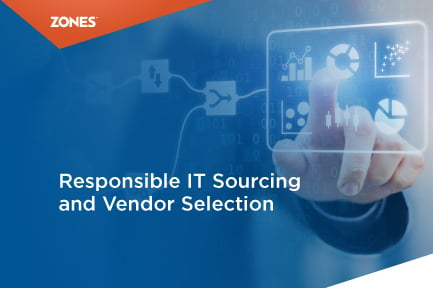10 Ways to Drive Sustainable IT with IT Asset Management (ITAM)
Climate change and environmental issues are major global challenges. This is why there is a growing recognition to mitigate the environmental impact...
2 min read
![]() Zones
:
Apr 25, 2024 11:11:16 AM
Zones
:
Apr 25, 2024 11:11:16 AM
-1.jpg)
Migrating to the cloud is a complicated process, especially for small- and medium-sized businesses (SMBs) lacking the resources and expertise of bigger corporations. At the same time, the move to the cloud is not only becoming a necessary condition for achieving operational efficiency and competitiveness but also the only way of developing growth and innovation. With the right strategy, SMBs can overcome challenges and turn them into opportunities. This blog explains why SMBs should choose cloud migration, lists the main obstacles they face, and finally explains that partnering with Zones allows SMBs to succeed in cloud adoption.
For SMBs, switching to cloud is not only necessary to remain relevant in the modern world but also a strategic move that creates growth opportunities and improves operations on all levels.
The following are the top four reasons for SMBs to migrate to the cloud:
The cloud helps SMBs streamline operations and utilize automation to free resources for strategic tasks.
Around 80% of companies admit that modifying existing applications to work with the cloud is costly and labor-intensive.
SMBs encounter difficulties with deploying cloud solutions that function effectively with their on-premise systems, which might be a challenge.
More than 80% of SMBs find it challenging to migrate applications and data among on-premise, public cloud, and edge environments.
SMBs must comply with various complicated regulatory guidelines and keep their data secure from harm throughout and after the migration.
A large number of SMBs take the view that the overall cost of moving applications and re-platforming is underestimated.
As SMBs lack knowledge of cloud technologies, they may struggle to implement cloud migration the right way, thus failing to realize its benefits. Consequently, these companies have a chance of suffering delays and financial losses.
How Zones Is Empowering SMBs for Cloud Success
Recognizing these challenges, Zones provides comprehensive cloud migration services tailored to the unique needs of SMBs. With its deep expertise and strategic partnerships with major cloud providers, Zones simplifies the migration process, reducing the risks and burdens on SMBs. The Zones ADIM Framework (assessment, design, implementation, migration) is a proven methodology that ensures a smooth and efficient transition to cloud platforms.-300x250-px-gif-1.gif?width=329&height=274&name=Display%20Testing%20(A)-300x250-px-gif-1.gif)
By partnering with Zones, SMBs gain access to a wealth of expertise, strategic insights, and customized services that ensure their cloud migration is not just successful but transformative. To know more,

Climate change and environmental issues are major global challenges. This is why there is a growing recognition to mitigate the environmental impact...

In today's rapidly evolving world, sustainability has become a non-negotiable aspect for every industry. The significance of adopting sustainable...

Technology today has become an integral part of our lives, driving innovation and shaping how we live and work. However, as our reliance on...